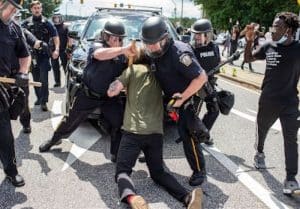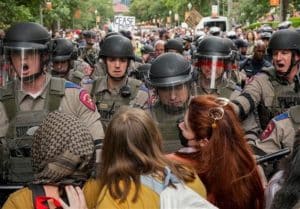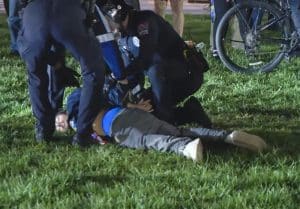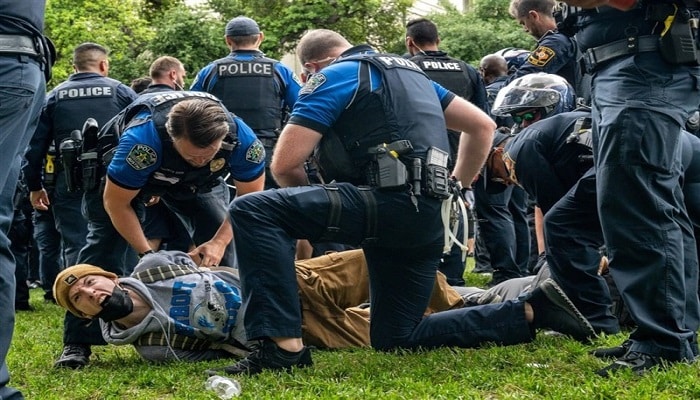PNN – US universities are using a combination of policing and disciplinary action to force students who are peacefully protesting the genocide in Gaza to withdraw.
According to the International group of Pakistan News Network, In the past few days, the American police have arrested more than 900 students who demonstrated throughout the country to support Palestine and oppose the crimes of the Zionist regime in Gaza. Despite this, the intensification of the repressions not only did not cause the demonstrations to subside, but also caused the anger of the protesters and the flare-up of the protests.
Juan Donovan, an American sociologist who has dedicated his work to studying social movements, predicted in a note in the Guardian newspaper that in the coming weeks, we will see the expansion of student camps in support of Palestine.
However, American universities are trying to force students to withdraw with a combination of repressive police measures and disciplinary orders. CNN reported that dozens of students who protested the war in Gaza were arrested at New York and Yale universities.
Read more:
Al-Akhbar revealed: The details of the Zionist regime’s offer to Hamas
Militarization of universities
At the University of Texas at Austin, police in riot gear and on horseback tried to disperse protesters. Nearly 100 people were arrested at the University of Southern California. At Emory University in Atlanta, police fired pepper spray at protesters and arrested 28 people, including several professors. At Emerson College in Boston, 108 other protesters were arrested and four officers were injured.
These violent crackdowns have reignited long-running debates about the role of campus policing. Analysts say that the militarization of the police after the events of September 11, 2001, which was visible in the protests of recent years, has shown itself this time in these demonstrations.
In an interview with CNN, Zach Greenberg, president of the American Foundation for Civil Liberties and Human Rights, said police presence on campus is a “severe action” that should be reserved for more direct and serious threats to campus.


The university officials have gone to war with the students with a series of disciplinary orders ranging from suspension from the university to expulsion and exclusion from exams and classes. While the students insist that their demonstrations are peaceful, university authorities describe the gatherings as “anti-Semitic” or “disruptive”.
The approach of repression instead of dialogue in the university program
In an announcement, the officials of Columbia University drew the sword for the students and warned that if the sit-ins are not found, crimes ranging from suspension to expulsion and deprivation of education await the students.
The response of the officials of the American universities to these demonstrations took place in the context of extensive discussions on the role of the United States in Israel’s war crimes; CNN writes that such debates have caused some university presidents to surrender to the pressure of congressional lawmakers or even to be removed from their positions in the past few months (as in the case of the president of Harvard University).

Many analysts consider the excessive resorting of universities to repressive tactics and methods to break the demonstrations as a sign of the universities’ unwillingness to talk with students and pay attention to their demands in the midst of the ruling institutions’ decision to unconditionally support Israel.
Dima Khalidi, managing director of “Palestine Legal” Institute, who has been representing students against disciplinary orders issued by universities for the past few months, said: “Instead of interacting with the protesters, they are suppressing them. The police response on many campuses is an example of a disturbing and troubling escalation of state repression and violence against students who are peacefully protesting an ongoing genocide.”
Gaza issues should not be sidelined by university protests
He stated: “All these are distractions for us to take our eyes from Gaza to the other side; Gaza, where mass graves are discovered, people are dying of starvation, and where 35,000 Palestinians have been killed. These are the issues that students are trying to draw the world’s attention to.”
In another part of his statement, Khalidi stated that issuing suspension orders to dissident students while simultaneously sending military aid to Israel sends a message to students and other like-minded people in society that “they don’t matter.” Despite this, the protesters do not give up their demands.

